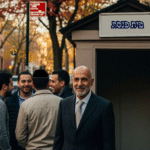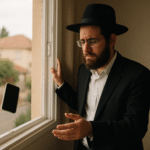He woke up with a strange feeling that morning. He knew it was a special day, but since back home it wasn’t given much importance, he assumed that abroad—here, in the middle of Boston—it wouldn’t be any different.
Cars moved as on any other day, the shops were open, and the smell of pastries that greeted him every morning drifted through the air and struck him. No flags were lowered, and life swirled around him.
He walked slowly, but he knew where he was going. He had seen them before, in the small building on Third Avenue. A modest place, a little hidden, yet plain to those who knew or wanted to know. He was among those who preferred not to know. In Israel, too, he hadn’t wanted to know—he preferred to live alongside it and not touch it.
His steps were hesitant. Who was inside? What were they doing? Did it look exactly as it did back home, in the few times he had gone there for family reasons? Did they speak Hebrew or prefer English? Did they like Israelis—or see them as unruly stepbrothers?
It took him another fifteen minutes, but he finally stood before the building. Two guards, whom he could not say for certain were armed, stood at the entrance. He wished them good morning and indicated that he wanted to go in. They looked him over, asked a few questions to determine his background, and finally asked for his ticket number.
He didn’t have one. In Israel he would have gone in and tried to find his place, but in America things were more orderly. Tickets were sold in advance, and everyone knew their seat. Israeli chaos gave way to the American art of lines and order.
One of the guards was sent inside to consult. He returned a few minutes later, accompanied by a member of the board.
“Hello. I’m sorry, but we sell tickets in advance. I’m not sure how we can arrange something now. I don’t take money on a day like this.”
“Ah, I don’t know. I thought you just come. I’m not used to this system. Don’t you have any seats available, even in the back?” the Israeli said.
“I’m not sure. It’s for members only. We haven’t really encountered situations like this.”
“I’m not very religious. I just wanted to be with you during these hours. I need to escape the noise outside. It’s not what I’m used to on this day.”
“Come in—we’ll find you a place. We won’t turn away a brother looking to connect with his people, even if he didn’t register. They’ll probably be angry with me, especially the elders up front, but come—we’re missing the prayers.”
He stepped through the gates of heaven. A small hall, full of people wrapped in prayer shawls. A symbolic partition, with a few women behind it, and the sound of prayer that rose yet remained within the space, not spilling into the street. The board member handed him a small prayer shawl and a prayer book and led him to a seat at the back. “May you be sealed for good,” he wished him before returning to his place.
Would God take his effort into account? Would he find redemption for this day here, in this small room, surrounded by people he did not know? He tucked himself into the back corner and focused on the prayer book. Unlike most people here, at least he understood what he was reading. From time to time they paused the service for explanations in English, and he learned a few things. In Israel they never stopped the service for explanations—if you didn’t understand, that was your problem; ask the rabbi during the break.
The prayers moved on, and suddenly he heard the choir—a heavenly sound in the middle of Yom Kippur, a voice breaking through the heavens like the boy whistling in that story. In Israel there was no choir: there was a cantor, and others who tried to compete with him and turn it into a talent show. Here there was no competing with the choir; the congregants simply sat and listened to that heavenly voice carrying their prayer.
The rabbi spoke. He didn’t try to frighten, didn’t threaten a cruel fate for those who failed to observe, and didn’t think the world was ending. He tried to explain, to tell stories, even to make them laugh. He understood he was in a marketing battle—the worshipers could choose not to buy a $1,000 High Holy Day seat—and he had to give them a good reason to do it again next year.
The Israeli suddenly understood all this. The packed synagogue of his childhood in the Krayot felt very far from the corner where he now sat. Is God here or there? Perhaps He is everywhere, for He has no bodily form and no body. Or perhaps He is nowhere—and everyone is pretending.
“May He who makes peace on high make peace upon us and upon all Israel—say, Amen,” the choir intoned.
He set the prayer book and shawl aside and slipped out. From the outside everything looked the same, but inside everything burned. He searched for an answer—and did not find one. Who is right? Who is wrong? Who at his appointed time and who before his time? Who will be brought low and who will be raised high? The Israeli didn’t know. He simply didn’t know.











